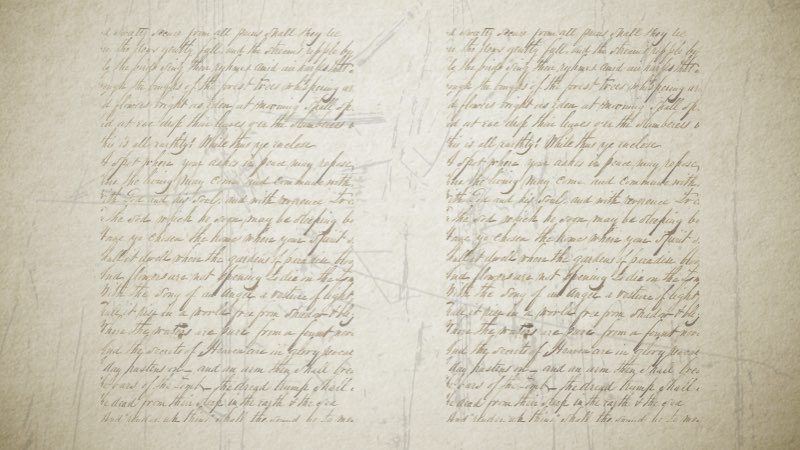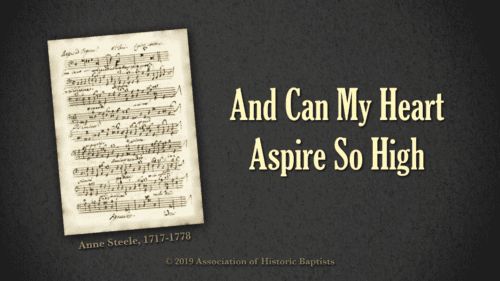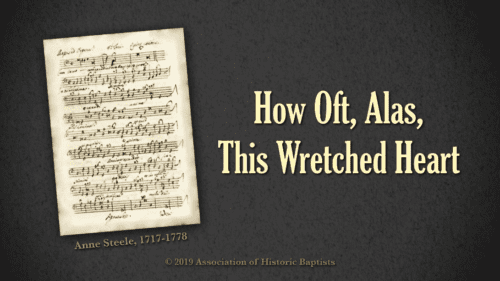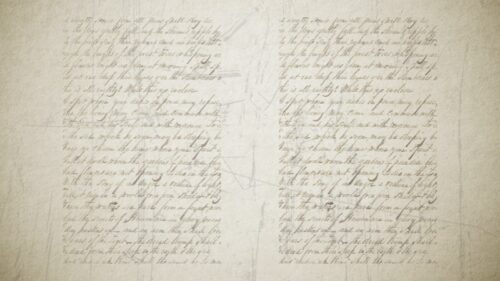
The Life And Testimony Of Anne Steele
The Sower 1895:
A Sweet Hymn Writer
Miss Steele was the descendant of a family who had inhabited for many years the village of Broughton, Hampshire, her father and ancestors being pastors of the Calvinistic Baptist congregation in that town, the foundation of which dates back to the time of the Commonwealth. One, Mr. Henry Steele, was ordained to the pastoral office in the year 1699, which office he held for forty years. He was very popular, and greatly beloved by many of the inhabitants of Broughton, so that on an episcopal visitation the clergyman complained to the Bishop that his parochial province was sadly invaded by the Dissenter. “How can I best oppose him?” was his query to the Bishop, the celebrated and godly Gilbert Burnett. “Go home,” said the wise diocesan, and preach better than Henry Steele, and the people will return.” A piece of good advice that might be happily followed now.
Henry Steele gave cottages and a burying-ground to the Church, and fitted up their place of worship in a very neat and substantial manner, and built the house as shown in the engraving. He was a man of exemplary piety, of great simplicity and industry. On Lord’s Day he spent the interval of worship with his friends in the meeting house, and it was said by many who remembered him that his conversation during these interviews was as beneficial as his preaching, if not more so. He died in 1739, aged eighty-five years, and was succeeded by his nephew, William Steele, Anne Steele’s father. One of his family describes him as a man of primitive piety, strict integrity, accompanied by the most unaffected humility. Without infringing on the duties of his pastoral office, he carried on an extensive business as a timber merchant, like his uncle; and as, by the blessing of Providence, he possessed a comfortable independence, his labours in the ministry were all gratuitous. He died September 10th, 1769, when only a month less than eighty years of age, after having preached to one congregation sixty years.
His daughter Anne was born in 1716. Owing to an accident in childhood, she was always an invalid, and often confined to her chamber. She had consented to give her hand in marriage to a young man named Elscourt, and the day of the marriage was fixed, but her intended, while bathing in a river on the day preceding it, incautiously went out of his depth, and was drowned. It is said that this painful trial led her to compose the hymn—
“Father, whate’er of earthly bliss
Thy sovereign will denies,” &c.
She began early to compose hymns and poetry, but it was some years before any were printed, which her father refers to in his diary:—
” November 29th, 1757.—This day Nanny sent a part of her composition to London to be printed, I entreat a gracious God, who enabled and stirred her up to such a work, to direct in it, and bless it for the good and comfort of many.”
“October, 1759.—Her brother brought with him her poetry, not yet bound. I earnestly desire the blessing of God upon that work, that it may be made very useful. I can admire the gifts that others are blessed with, and praise God for His distinguishing favours to our family.”
“November 27th.—Mr. W. spoke very highly in commendation of her book. I pray God to make it useful and keep her humble.”
The following is a letter to her father:—
“HONOURED FATHER,—As many of these verses have been favoured with your approbation, I have now, at your desire, collected them into a little book, which I beg leave to present to you as an humble acknowledgment of my grateful sense of your parental affection and the benefit I have received from your instruction. If you should survive me, it will, I doubt not, be preserved by you (how inconsiderable its real value) as a mournfully pleasing remembrance of a departed child who once shared your tender regard. If you think they are capable of affording pleasure or profit, you may, if you please, communicate any of them to friends or fellow Christians. They may, perhaps, find seasons when the thoughts of the unworthy writer may suit their own, and the remembrance produce delight. If while I am sleeping in the silent grave my thoughts are of any real benefit to the meanest of the servants of my God, be the praise ascribed to the Almighty Giver of all grace.”
In a letter to her sister we read: “I enjoy a calm evening on the terrace walk, and I wish, though in vain, for numbers, sweet as the lovely prospect and gentle as the vernal breeze, to describe the beauties of charming spring; but the reflection, how soon these blooming pleasures will vanish, spreads a melancholy gloom, till the mind rises by a delightful transition to the celestial Eden.”
She survived her father some years, whose death was such a shock to her tender frame that she never recovered it, but looked with sweet resignation for her dissolution; and when at last the happy moment arrived, she was full of peace and joy, Though her body was racked with pain, she uttered not a murmuring word. She took the most affectionate leave of her weeping friends around her, and then with these triumphant words upon her lips, “I know that my Redeemer liveth,” closed her eyes, and fell asleep in Jesus, November, 1778, aged sixty-one years, having been a member of the Calvinistic Baptist Church forty-six years. She was one of the earliest of female hymn writers, and her precious hymns, published under the signature of “Theodosia,” are to be found in many selections, and are much valued by the true Christian. They sweetly and preciously breathe forth the love of Jesus, as known and experienced in a living, exercised soul. I conclude with a short one:—
“Jesus, in Thy transporting name,
What blissful glories rise;
Jesus, the angels’ sweetest theme,
The wonder of the skies.
“Jesus, and didst Thou leave the sky
For miseries and woes?
And didst Thou bleed and groan and die
For vile, rebellious foes?
“Victorious love! can language tell
The wonders of Thy power,
Which conquered all the force of hell
In that tremendous hour?
“Well might the heavens with wonder view
A love so strange as Thine;
No thought of angels ever knew
Compassion so divine.”

Anne Steele
Anne Steele (1716-1778) was a poet and hymn writer. She was contemporary with John Gill, Augustus Toplady and George Whitefield. Her ancestors were numbered among the Puritans and she hailed from a long line of gospel preachers. She was the eldest daughter of a Baptist preacher named William Steele. He oversaw a congregation in Hampshire, England, where he and his family lived. At an early age, her mother died. A few years later she sustained a permanent injury to her hip after falling from a horse. After her twenty-first birthday, she was married to a Mr. Elscourt, but he died on the day of their wedding in a drowning accident. She therefore lived under her father’s care until his death, at which time she lived with her brother for the remainder of her life. After showing a gift for writing poetry, her father advised her to use a pseudonym so as not to be lifted up with pride. She therefore attributed her poems and hymns to the name “Theodocia”, which means “devoted to God”. She prepared her first selection of hymns while in her forties, on which occasion her father recorded in his diary—“Nov. 29. 1757, This day, Nanny sent part of her composition to London, to be printed. I entreat a gracious God, who enabled, and stirred her up to such a work, to direct in it and bless it for the good of many…I pray God to make it useful, and keep her humble."
"ALAS, HOW OFT, THIS WRETCHED HEART"





